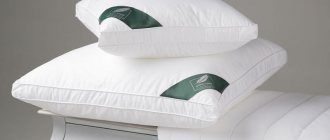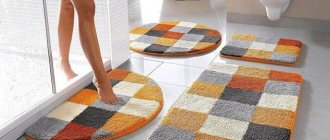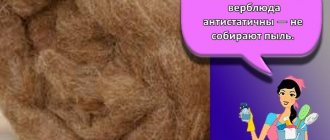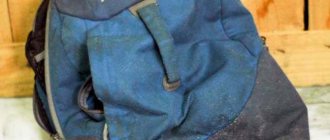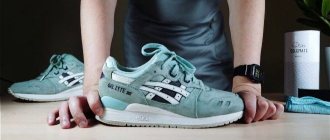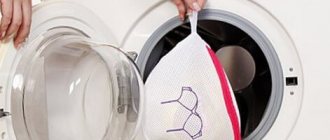Home page » Home and comfort » Wardrobe care
Author of the article
Svetlana Pavlikhina
Reading time: 6 minutes
AA
Drape is a material made from a special type of wool with a dense and heavy structure. Coats made from it are popular in the autumn-winter period, as they retain heat well and do not allow the wind to pass through. In order to maintain the appearance of the drape, you need to properly wash and care for it.
Is it washable?
Over time, any thing becomes dirty. Dry cleaning is the most effective and safe way to clean drape clothing.
If this is not possible, then the question arises of how to wash it at home.
Machine washable
Many experts say that washing a wool coat in a washing machine is risky. If the product is expensive, then you should not experiment; it is better to entrust the matter to professionals.
Drape is often treated with a special compound that ensures the strength and smoothness of the fabric, but does not withstand aggressive influences.
There is a high risk that the product will “sit” and lose shape.
Look at the label; if the crossed out machine sign is missing, you can wash it.
When the tag indicates a natural fiber content of more than 65%, machine washing is prohibited. Please also note that spinning after washing can stretch the item, so if you decide to use it, choose the minimum speed.
Handwash
Hand washing is the best option for caring for a drape coat. This is a gentle way to cleanse dirt. The material retains its shape, eliminating the risk of damaging the fabric.
Individual contaminated areas are also treated without washing the entire product using special products selected for each type of stain separately.
Hand washing preserves the shape, color and appearance of the coat.
Types and color of drape
Depending on the production technology and the company producing the drape material, pure wool and half-woolen types are distinguished:
- High-quality material is made from natural wool threads, only 15% additives are allowed (chemical processing of wool, dyes). This is a durable, strong, expensive, high-quality and valuable material.
- The wool blend material contains admixtures of both nylon and viscose, cotton, and linen yarns. Usually, lower quality yarns are used on the inside of the product with the addition of wool recovered from waste, so the wrong side has a loose structure. This does not affect the appearance of the drape product, but can significantly reduce its weight and overall density.
Basic washing rules
The product may contain polyester, cashmere, wool, so the cleaning method will differ.
In order not to spoil the item, you must follow the following rules:
- Be sure to read the label for washing instructions.
- For cleaning, use products intended for delicate fabrics. It is better not to use aggressive chemicals and traditional methods.
- You need to soak your coat. If an automatic machine does not allow you to do this, you should wash it by hand.
- An important step is rinsing. If the detergents are not washed off well, streaks or stains will remain on the material.
- Test the chosen product on an inconspicuous area - this way you can make sure of its reliability.
Is it possible to iron a drape coat?
If washing and drying went well, then most likely you can avoid ironing. Creases rarely appear on drape fabric. If you have a steamer in your home, tidying up your outfit won’t be difficult. A coat made of all-natural fiber can only be ironed under the influence of steam from an iron or steam generator. Products containing mixed fibers can be ironed in the usual way, through a damp cloth. First, make sure that the iron label is not crossed out, which means ironing is permissible. We set the allowed temperature.
Preparing items for washing
Cleaning clothes requires careful preparation.
The first step is to inspect the product and select the correct washing mode:
- Before cleaning, remove the fur parts as they will deteriorate if they come into contact with water.
- If cuffs, collars, or inserts come loose, they should be removed.
- Be sure to check the pockets to ensure no objects or debris are left behind.
- Sometimes you need to cut off all the buttons if they can damage the fabric. Fasten the smooth, round buttons and turn the garment inside out.
- If you choose to machine wash, pre-treat stained areas with soap and water.
How to wash in a washing machine
Cleaning a drape coat in an automatic device requires delicate handling.
Follow the instructions to avoid negative consequences:
- Turn on pre-soak mode for 30 minutes. During this time, the fabric will get wet and the dirt will soften.
- Use only special products; conditioners and rinses should not be added.
- Place your coat in a wash bag or pillowcase to prevent puffs from forming on the fabric.
- Spin can be up to a maximum of 600 rpm.
At what temperature should I wash?
The exact temperature is determined by the quality of the fabric and the presence of parts. General recommendations for washing drapery items: temperature +34 ⁰С.
Washing mode
To wash a coat in a washing machine, use the gentle and manual mode.
The delicate program takes place at a temperature acceptable for the drape product. You can also use the “Wool” mode.
How to clean a light-colored drape item?
A light drape coat requires special attention, careful wearing and careful cleaning. Due to its color, various contaminants are visible on it much more than on similar models of dark colors.
At the same time, stains on a coat can have a very different origin and the process of cleaning them, as a rule, will be unique for each type of pollution:
- Hydrogen peroxide will help deal with stains from beer and cola (with a cotton pad soaked in peroxide, gently blot the stain until it is completely removed).
- Potato starch or baby powder will make it easier to remove grease stains. These bulk products should be sprinkled generously on the greasy stain and left for 30 minutes.
- Alcohol and water can easily cope with stains from coffee and juices (you need to make a solution in a 1:1 ratio of water and alcohol, soak a cotton pad in the solution and treat the stain with this disc).
After removing stains from the surface of the product, you can begin washing it directly in a washing machine or by hand (if required).
When removing stains from a light drape coat, under the threat of damaging the item,
you should not use the following substances:
- vinegar;
- lemon;
- petrol;
- acetone.
Handwash
If there is a sign of hands immersed in a bowl on the coat label, then the item can be washed by hand:
- Fill the container with water +30...+40 ⁰С and soak the product for 30-60 minutes.
- Add wool detergent to the liquid.
- Press down on the coat to absorb the water.
- The fabric is lightweight; you cannot rub the surface so as not to contribute to the appearance of pellets.
- Rinse the coat in cold water 2-3 times until the soap suds disappear. During and after rinsing, do not wring out the product; the water must be allowed to drain. Remove excess moisture with a towel, wrapping your coat in it.
- Drying should be done in a horizontal position, the room should be well ventilated.
- Be sure to straighten all the bends so that the item dries perfectly and there is no need for ironing.
- If the product cannot be wetted, you need to treat individual areas. To do this, take a solution of water and washing powder for hand washing. Using a soft sponge, apply the product to the stain and wash it off with a damp cloth to avoid streaks.
Drying rules
Before drying the product, be sure to allow the water to drain completely. Be sure to hang a coat or suit over a bathtub or a wide basin - the liquid will drain for a long time.
Carry out drying on the balcony, hanging the item on hangers, straightening out the folds with your hands. A simple trick will help speed up the process - wrap the item in a terry towel (sheet) and roll it on a flat surface.
Change the dry cloth several times - it quickly absorbs moisture. After this, hang it in a draft, preferably not in the sun. Be sure to make sure that there are no heat sources nearby - under the influence of high temperatures, the coat can become deformed.
Features of washing coats of different colors
The color of the product affects the method of cleaning and application of products.
Light shades
Light-colored items require careful washing and rinsing with soapy water. The wrong technology will turn white into grey.
White drape allows the use of powder with bleaching agents or regular laundry detergent. The product is applied to the stain, rubbed in a little and removed with a brush after half an hour.
Coat of dark shades
The drape is cleaned with carpet powder. The product is pre-mixed with water and whipped until foamy. It is this that is applied to the stain and then removed with a brush.
Black tea is also used: take a cotton pad and dip it in the strong drink, wipe off the dirt and let it dry.
Features of care and wear
In order for a coat to retain its original appearance for a long time, you need to learn how to not only wash and dry it correctly, but also wear it and store it in the off-season:
- after the end of the season, it is cleaned or washed according to the information on the label, packed in a plastic case, hung on thick hangers and sent to the closet;
- It is better not to wear a coat made of natural wool regularly.
As for the rules of care, then:
- If exposed to snow or rain, clothes are immediately cleaned of dirt and dried in an upright position on hangers in a ventilated area.
- If there are greasy stubborn stains, use talc or starch. The product is applied to the stain, left for a while and ironed with a hot iron through a clean sheet of paper. If necessary, the procedure is repeated until the stain disappears from the product.
- Unpleasant odors are removed from wool using soda. To do this, sprinkle the clothes with soda and leave for 12 hours. This will be enough for it to absorb all the aromas.
- Worn areas on the collar, cuffs and in the pocket area are smoothed with an iron using the steam function.
- To care for a woolen coat, special rollers and brushes with adhesive tape are used, which will collect all the dust, dirt and small lint.
- A coat made of any type of fabric should not be hung by a loop for a long time, as it will become deformed and lose its shape.
In conclusion, it is worth noting that the correct approach to washing and drying any fabric will prolong its aesthetics and help maintain its shape. Always study the manufacturer's requirements and recommendations indicated on the label during the washing, drying and ironing process. Then your coat will look like the first day you bought it and will keep you warm in cool and damp weather.
How not to spoil something
To preserve things and clean them efficiently, follow these recommendations:
- choose washing powder that does not contain bleaching components, otherwise it will ruin the color of the fabric;
- When in contact with water, glued parts may fall off, fade and ruin the appearance of the coat; in this case, special care must be taken;
- bright fabric should be checked for color fastness so that it does not fade;
- the optimal washing temperature is selected: too hot water will shrink, and cold water will not remove dirt;
- After washing, the product must be dried, since a wet drape can become deformed under its own weight;
- Do not wring out the fabric; water can be eliminated by applying downward pressure or using a towel (by wrapping the item in it and squeezing it slightly).
How to stroke?
Before ironing your coat, read the label information. Set the iron to the desired temperature. When ironing a drape coat, it is best to use the steam function. If your device does not provide it, then it can be replaced by ironing the product through a damp natural fabric, for example, chintz or gauze, folded in several layers.
Try to clean your drape coat every time before storing it after the end of the cold season. This will help you prevent damage to the product by moths. To repel moths, you can additionally use special means.
We hope that our tips will help you cope with such a task as washing a drape coat. Try to follow the directions on the product label so that the item will last longer and you won’t have to throw it away after one or two seasons.
For more tips on how to properly care for your coat, watch the following video.
When should a coat be soaked before washing?
Soaking is a preliminary process. During prolonged immersion in water, dirt transfers from the product to the water.
If severe contamination is observed, then soaking is necessary:
- For the procedure, you should choose suitable detergents.
- Study the composition of the fabric.
- The procedure can take from 10 minutes to several hours.
- Use a temperature of +30 ⁰С (in cold water the process will go slower).
- If there are stains on things, you first need to remove them.
- Soaking will help prevent shrinkage.
- White things cannot be kept in water for a long time.
- Sometimes it is necessary to perform the procedure 2 times.
A few words about drape material
From the very beginning, such a product is considered durable and reliable. And this is true, since the drape is multi-layered; certain types of wool are used in its manufacture with the addition of cotton and linen threads. All this makes the material resistant to wear, it wrinkles little and holds its original shape perfectly.
In caring for it, you should know certain rules for organizing washing, choosing detergent compositions, storing and drying. It is believed that even the highest quality drape can accumulate dust during storage and periodically needs cleaning.
Alternative to washing - dry cleaning
When the label says dry clean only, that means this is the only way to clean your drape coat. Often the seams of products are impregnated with a water-repellent composition, so the material cannot be wetted .
Procedure:
- First, the fabric is knocked out, then vacuumed using a furniture attachment.
- Areas with heavy contamination are inspected: sleeves, pockets, collar. These places are sprinkled with a special product, starch or talcum powder for 2-6 hours. Once the grease and dirt are absorbed, brush off the dry cleaner.
- Cover the stain with a paper towel and run a hot iron over it.
- Individual stains may require additional treatment. Apply detergent to the dirty area using a cotton pad, and gently wipe the stain from the edge to the center so as not to increase the size of the stain. It is recommended to change the disc frequently.
Selecting a detergent
Regardless of whether a drape coat can be washed in a washing machine or is only allowed to be washed by hand, it is recommended to use detergents that rinse well and do not leave streaks on clothes. The choice should be made on liquid products such as gels and capsules. It is advisable to choose products in accordance with the color of things: for colored, for white, for black.
Attention! Do not use detergents that contain chlorine or active oxygen.
Basic rules of care
In order for the fabric to retain its rich color and shape, you must follow the rules for caring for your drape coat after washing:
- When washing is completed in any way, dry the coat and hang it on a hanger so that it takes the desired shape.
- Store the product correctly to eliminate the need to straighten out creases.
- If a stain appears on the item, remove it as soon as possible.
- After wearing, be sure to air the coat, only then hang it in the closet.
- The drape product should rest; do not wear it for two days in a row.
- Regularly remove dust and dirt using a roller brush. This will preserve the appearance of the clothes for a long time.
- The product is cleaned twice a year before and after the wearing season.
After studying the recommendations, feel free to start washing your drape coat. Proper cleaning by any chosen method preserves the color, shape and beauty of the item.
Previous
Caring for your wardrobeHow to wash a jacket on padding polyester: in the machine and by hand
Next
Caring for your wardrobeHow to wash a polyester jacket: in the machine and by hand
Bleaching things
Using bleach even on light-colored drape items is a sure way to irrevocably ruin a coat or suit. Even gentle preparations are not able to remove yellowness evenly, so it is better not to risk it and resort to simple washing using detergents.
Bleaching is prohibited not only for outerwear, but also for hats or scarves - experiments will have a detrimental effect on the appearance of the product.
Another disadvantage of using bleaching agents is that aggressive particles wash away a special substance that binds wool fibers and increases the wear resistance of the fabric.
